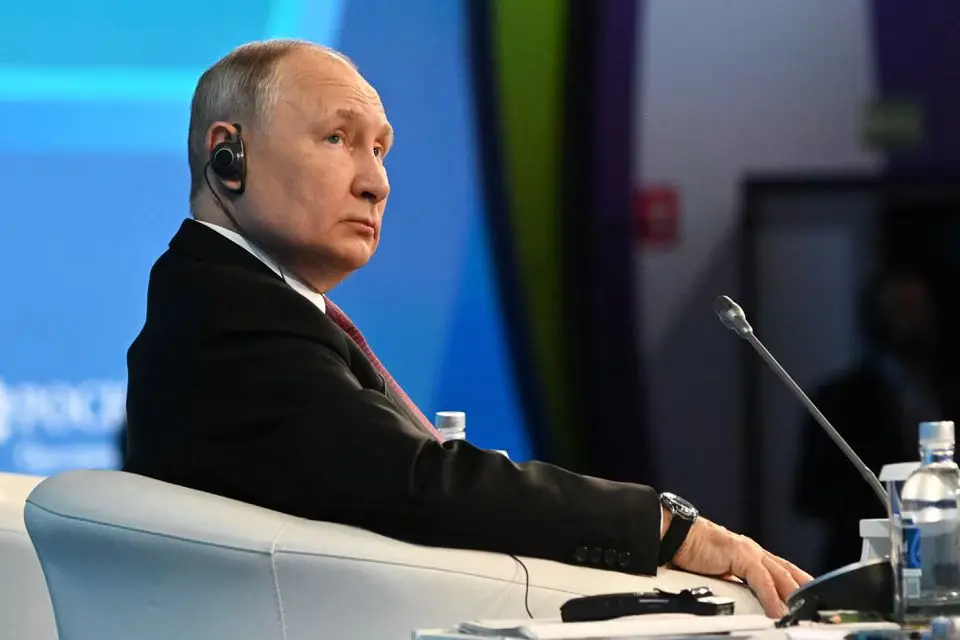Putin's perspective on the U.S. deployment of an aircraft carrier group in the Middle East and its implications for regional tensions.

In a surprising turn of events, Russian President Vladimir Putin has expressed deep concerns about the United States' decision to deploy an aircraft carrier group to the Middle East. Speaking at the 2023 Russian Energy Week international forum in Moscow, Putin criticized this move, stating that it could further exacerbate tensions in the region. He emphasized the importance of seeking compromise solutions rather than resorting to military presence. This unexpected criticism comes in the wake of recent violence between Israel and the Palestinians, and Putin's remarks shed light on his perspective regarding U.S. involvement in the Middle East.
Escalating Tensions
The recent escalation in tensions began with a surprise attack by Hamas militants on Israel, prompting the U.S. Defense Secretary, Lloyd Austin, to announce the deployment of a carrier strike group, including the USS Gerald R. Ford, closer to Israel. This decision was met with criticism from various quarters, including Turkish President Tayyip Erdogan. However, it was Putin's comments at the energy conference that garnered significant attention.
Putin’s Puzzlement
"I don't understand why the U.S. is dragging aircraft carrier groups into the Mediterranean Sea. I don't really understand the point. Are they going to bomb Lebanon or what?" Putin questioned during his speech. His remarks highlighted the lack of clarity surrounding the U.S. military's intentions in the region. He further inquired if the deployment was an attempt to intimidate, emphasizing that such actions could inflame the situation rather than resolve it.
The Need for Compromise
Putin's primary message was the importance of finding compromise solutions. He argued that simply increasing military presence would not lead to a resolution of the complex issues in the Middle East. He criticized the U.S. for bypassing established diplomatic processes and taking matters into its own hands, without addressing the fundamental needs and concerns of the Palestinians.
The Iranian Angle
Addressing the accusations against Iran, Putin expressed skepticism. "Now, we hear Iran is being accused of all sorts of things, as usual without evidence. Let's see, hopefully common sense will prevail," he remarked. Tehran had already denied involvement in Hamas's attack on Israel, adding another layer of complexity to the situation.
The Broader Implications
The Russian President underlined the gravity of the situation in Israel, describing the violence as "terrible." He insisted that addressing the core issue of a Palestinian state's creation was essential for resolving the wider conflict. Furthermore, he cautioned that any escalation in the conflict zone could have severe consequences for various sectors, including logistics, insurance, and freight, with the potential to affect global energy markets.
Conclusion
Putin's unexpected critique of the U.S. military's presence in the Middle East underscores the complexity and sensitivity of the region's geopolitical dynamics. The call for compromise and diplomatic solutions, rather than military escalation, is a perspective that may influence the ongoing discussions regarding the Middle East conflict. As the situation continues to evolve, the world will be closely watching how these geopolitical tensions are managed and resolved.
FAQs
Why did Putin accuse the U.S. of inflaming the Middle East?
Putin expressed concerns over the U.S. deployment of an aircraft carrier group in response to the recent attack on Israel by Hamas militants. He believed it was an unnecessary escalation.
What were Putin’s specific concerns about this U.S. move?
Putin questioned the purpose of deploying the aircraft carrier group and whether it aimed to bomb Lebanon or intimidate someone. He felt that the U.S. was sidestepping established diplomatic processes.
Why did Putin mention Iran in his statement?
Putin mentioned Iran because the U.S. had accused Iran of involvement in the attack on Israel by Hamas. He emphasized the need for concrete evidence in such accusations.
How does Putin believe the conflict in Israel can be resolved?
Putin emphasized the importance of addressing key issues, including the creation of a Palestinian state, to find a comprehensive solution to the Israeli-Palestinian conflict.
What are the potential consequences of an escalation in the Middle East conflict?
Putin warned that an escalation could impact various sectors, including logistics, insurance, and freight, though it might not directly affect energy production.